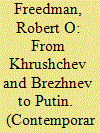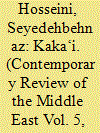|
|
|
Sort Order |
|
|
|
Items / Page
|
|
|
|
|
|
|
| Srl | Item |
| 1 |
ID:
159975


|
|
|
|
|
| Summary/Abstract |
For a gentile, kafir, infidel and pagan, Jerusalem might be another piece of territory as good or as bad as Alaska. This is, however, not true for the followers of the three Abrahamic faiths, and with valid reasons. Their genealogical trajectory is sequential and closely intertwined, and some of their key historical moments are traced to the City of Jerusalem. Religion is an article of faith, and hence one either accepts all beliefs and traditions or rejects them altogether; modernity presupposes that no faith is inherently superior to or supersedes the other.
|
|
|
|
|
|
|
|
|
|
|
|
|
|
|
|
| 2 |
ID:
159976


|
|
|
|
|
| Summary/Abstract |
Russian under President Vladimir Putin has established a strong presence in the Middle East. In fact, in 2017, Russian involvement in the regional affairs is more pronounced. Putin has done his utmost to restore Russia’s prestige in the region and has been successful to an extent. Russia though for a brief period lost out to the USA, especially in the case of Iraq and Libya but its decisive intervention in Syria has changed the dynamics. If one compares the policies followed by the Soviet Union in the Middle East during the reigns of Nikita Khrushchev and Leonid Brezhnev to the present situation some interesting parallels can be drawn. However, it should be noted that the goals and policies pursued by Putin are entirely different. But in comparing the position of Russia in the Middle East under Putin to the Soviet position in the region under Khrushchev and Brezhnev is much stronger.
|
|
|
|
|
|
|
|
|
|
|
|
|
|
|
|
| 3 |
ID:
159979


|
|
|
|
|
| Summary/Abstract |
The religion of Kaka‘I has been an under-researched religion in the Middle East but recent interest in Iraq has changed this situation marginally. A new discourse in the contemporary social and political world has brought back the notion of religion and the appropriation of religious thought to the forefront of social polemics. Following continuous murders, displacements and threats by the militant Islamic group, the Islamic State (IS), as well as their marginalization in Iraq, Kaka‘i declared themselves to be Muslims. They sought improvement in the quality of systems existing in region, the creation of democratic secular regimes that believe in democracy and rights of other peoples and religions, as well as the application of human rights principles in the constitutions of states in which they reside. In addition, Kaka‘i are motivated to gain official recognition of their civil statutes and identity and they want to end the situation in which they are considered as a religious minority. Kaka‘i and Islam are incompatible as religions. Such actions bring to mind the historical and modern perspectives that form the basis of religion with regard to the development of this religious minority under the pressure of their environment.
|
|
|
|
|
|
|
|
|
|
|
|
|
|
|
|
| 4 |
ID:
159978


|
|
|
|
|
| Summary/Abstract |
In their attempt to stay the tide of falling oil prices, in November 2016, the Organization of Petroleum Exporting Countries (OPEC) producers decided to cut back output with some members, notably Iran, being exempted from the scheme. The collective decision had the approval of Saudi Arabia at a time when its decades-old rivalry with Iran was escalating into bloody proxy wars, at least partly financed by the two governments’ oil revenues. As such, the hostility between the two countries had cast doubt on OPEC’s power of effective intervention in the oil market and even its very survival. Yet, not for the first time in its history, the organization escaped the fate of many similar associations of states which have fallen victim to internal political squabbles. What has been the secret of the survival of this particular entity and what lessons it may have for preserving existing international associations of nations? This article discusses these questions in the light of the history of OPEC and relations between Saudi Arabia and Iran as rival regional powers and founding members of the organization.
|
|
|
|
|
|
|
|
|
|
|
|
|
|
|
|
| 5 |
ID:
159977


|
|
|
|
|
| Summary/Abstract |
The role of the United Nations (UN) in response to the developments in the Arab world should be viewed in the context of the larger trends of thought and action in the world organization in promoting democracy as a norm during the past nearly two decades. The norm of establishing accountability as against impunity has found wide acceptance to define the relationship between the rulers and the ruled in the new century. Against this background, the great expectations about the UN as a powerful transformational tool toward democratization had received a setback with tempering experiences in responding to developments in Egypt, Libya, Syria, and Yemen since 2011. While the UN remained a bystander in Egypt in the wake of a coup against President Mohammed Morsi in 2013, it is striking that UN actions in Libya had cascading effect on its failure to act in Syria, which in turn produced a sense of fatigue in dealing with the situation in Yemen. In Libya’s case, the UN authorized military intervention did more harm than good to the cause of civilian protection and establishment of peaceful transition, but in Syria’s case, the military and political developments took place outside in the region and between major powers because of the diplomatic deadlock in the Security Council. Yemen comes out as a humanitarian nightmare, because of the exploitation of internal tribal suspicions by the regional geopolitical interests, which primarily spoiled all prospects of a promising role of the UN in providing a democratic framework of constitutional governance. The UN was unfortunately unable to exploit the opportunities thrown up by the Arab Spring as shown by its experiences in Libya, Syria, and Yemen.
|
|
|
|
|
|
|
|
|
|
|
|
|
|
|
|
| 6 |
ID:
159980


|
|
|
|
|
| Summary/Abstract |
Back in 1906, when there were some 600,000 Arabs and 60,000 Jews in Palestine, Dr Chaim Weizmann—a leading British Zionist activist and, later, president of the World Zionist Organization and the first president of the State of Israel—visited the country for two weeks. He toured its towns and drove through or by its villages, and sent letters home, then and in the following weeks, to his wife in England and to others. He mentioned only Jewish settlements and Jews he had met—not one word about Arabs. It was as if Palestine had no Arabs.
|
|
|
|
|
|
|
|
|
|
|
|
|
|
|
|
|
|
|
|
|